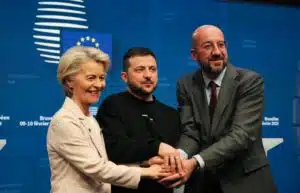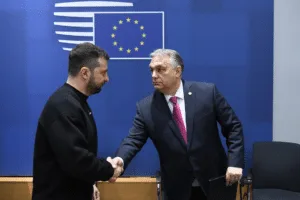Brussels – Ukraine and Moldova are now counting down the days to the formal start of the EU accession process, with the “in principle” green light on accession negotiations soon to become a reality for the two countries that have been candidates for EU membership for exactly two years. As EU sources tell Eunews, the vote to approve the negotiating frameworks with Kyiv and Chișinău will be held at the Economic and Financial Affairs (ECOFIN) Council on Friday (June 21) as an agenda item without discussion. The same sources specify that, after the okay of the 27 EU governments—which should come without any surprises, also given the voting mode—the Belgian rotating presidency of the EU Council will convene next Tuesday (June 25) the first intergovernmental conferences “in the early afternoon” on the sidelines of the General Affairs Council.

The
beginning of EU accession negotiations for Ukraine and Moldova has been a hot
topic in Brussels for weeks. The Belgian presidency, along with 12 governments more in favour of accessions, have been keeping an eye on June 25 as the deadline
for starting the transfer of power to Hungary for the EU institution’s
six-month leadership.
After the first negative vote at the Committee of Permanent Representatives (COREPER) on May 29, due to the Hungarian objections on Ukraine, Belgian negotiators worked tirelessly to smooth out Budapest’s resistance (never insurmountable, actually) and allow a general understanding to be reached for the formal vote. The issue returned to the ambassadors’ table last Friday evening (June 14), with the new compromise text finding agreement in principle from all the twenty-seven countries. As already announced at the end of the COREPER meeting, “the Belgian presidency will convene the first intergovernmental conferences on June 25,” although the Netherlands will first have to lift its parliamentary reservation (i.e., it will need a vote of 150 MPs to authorize the government to approve the proposed negotiating frameworks).
After the candidate country status was granted in June 2022 and despite the steady progress recorded by the European Commission over the next year and a half, the Hungarian prime minister, Viktor Orbán, had chosen the the path of obstructionism to try to prevent the green light for accession negotiations with Kyiv. Only after constant pressure from the EU institutions—and the unblocking by the Commission of about 10 billion euros frozen in Budapest—did Orbán make a rather unusual and striking gesture at the December 14, 2023, European Council: he left the room at the time of the vote so that the other 26 EU leaders could approve the most eagerly awaited of the summit conclusions. With the conclusions of the March 21 European Council, the heads of state and government then called on the 27 European affairs ministers to “swiftly adopt” the draft negotiating frameworks and “take the work forward without delay”.

The president of the European Council himself, Charles Michel, had confessed on that occasion that the hope was to “arrive at the first intergovernmental conference under the Belgian presidency” before the baton was passed to Hungary for the establishment of calendars and agenda items for the meetings of ministers in the different Council compositions. As per last weeks’ forecast, the Hungarian government has dropped its reservations—sparing no suspense in EU institutions—on minority rights in Ukraine, trade, anti-corruption, agriculture, operation of the Single Market, and good neighborly relations, thanks in part to Kyiv’s strong commitment with its response to the 11-point list drawn up by Budapest. If the long-awaited green light for accession negotiations comes on June 21 and the first intergovernmental conferences four days later, the Orbán government will not have to worry about constant controversies over the issue of Ukraine’s accession talks during its six-month presidency. Not to mention that this is certainly not the last opportunity for Hungary to use its veto power to block Kyiv’s EU membership.
How the EU accession process works
The EU enlargement process begins with a non-EU state submitting a formal application for membership to the rotating presidency of the Council of the European Union. Union membership first requires a successful examination of the Copenhagen criteria (established at the European Council in the Danish capital in 1993 and strengthened by the EU leaders’ meeting in Madrid two years later). These criteria are divided into three groups of basic requests that the Union addresses to the country that has applied for membership: rule of law and democratic institutions (including respect for human rights and the protection of minorities), stable market economy (ability to cope with market forces and competitive pressure), and fulfilment of its obligations (effectively implementing the body of EU law and meeting the objectives of political, economic, and monetary union).
Having obtained the positive opinion of the Commission, it comes to the conferment of candidate country status with the approval of all members of the Union. This is followed by the Commission’s recommendation to the EU Council to open negotiations which, again, requires the unanimous go-ahead of the member countries: this allows the negotiating chapters (varying in number) to be opened, the purpose of which is to prepare the candidate, particularly on the implementation of the necessary judicial, administrative and economic reforms. When the negotiations are completed, and EU enlargement is possible in terms of absorption capacity, this leads to the signing of the Accession Treaty (with terms and conditions for accession, including any safeguard clauses and transitional provisions), which must first be approved unanimously by the European Parliament and the Council.
Where does EU enlargement stand
The upheaval in EU enlargement began four days after the Russian armed aggression when, in the midst of the war, Ukraine applied for “immediate” membership in the Union, with the application signed on February 28, 2022, by President Zelensky. Demonstrating the irreversibility of a process of rapprochement with Brussels as a clear reaction to the risk of seeing its independence from Moscow erased, three days later (March 3), Georgia and Moldova also decided to take the same path. The European Council of June 23, 2022, approved the line drawn by the Commission in its recommendation: Kyiv and Chișinău became the sixth and seventh candidates for EU membership, while Tbilisi was recognized as having a European perspective in the EU enlargement process. In the EU Enlargement Package 2023 the Commission recommended to the Council to open accession negotiations with Ukraine and Moldova and to grant Georgia candidate status. All requests were then accepted by the December EU leaders’ summit, and now only the formal start of negotiations and adoption of negotiating frameworks for the first two are awaited. 
Of the six Western Balkan countries that have begun the long road to EU membership, four have already begun accession negotiations (Albania, North Macedonia, Montenegro, and Serbia), one has received candidate status (Bosnia and Herzegovina), and the last has formally applied for and is awaiting the response (Kosovo). For Albania and North Macedonia, negotiations began in July last year after waiting eight and 17 years, respectively, while Montenegro and Serbia have been at this stage for 12 and 10 years, respectively. After six years of applying for EU membership, Bosnia and Herzegovina became a candidate on December 15, 2022, also to join the Union and at the European Council on March 21, received the endorsement to formally start accession negotiations. Kosovo is in the most complicated position since a formal request was sent in late 2022: since its unilateral declaration of independence from Belgrade in 2008, five EU member states (Cyprus, Greece, Romania, Spain, and Slovakia) still do not recognize it as a sovereign state.
Negotiations for Turkey‘s accession to the European Union, on the other hand, were launched in 2005, but have been frozen now since 2018 due to backward steps on democracy, rule of law, fundamental rights, and independence of the judiciary. In the chapter on Turkey in the latest annual Enlargement Package presented in October 2022, it was put in black and white that it “does not reverse course and continues to move away from EU positions on the rule of law, increasing tensions over border respect in the Eastern Mediterranean.” At the NATO summit in Vilnius at the end of June, the Turkish president, Recep Tayyip Erdoğan, tried to force his hand, threatening that he would bind Sweden’s membership in the Atlantic Alliance when Brussels opens Turkey’s path back to the EU. The blackmail failed, but the dossier on Ankara was addressed in a special strategic report in Brussels.
Find more insights on EU enlargement in the newsletter BarBalcani hosted by Eunews
English version by the Translation Service of Withub









